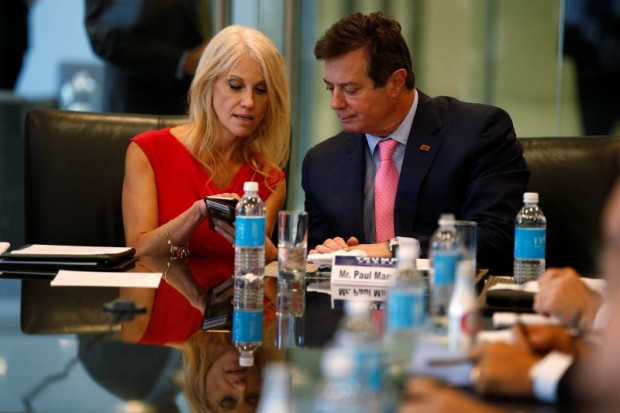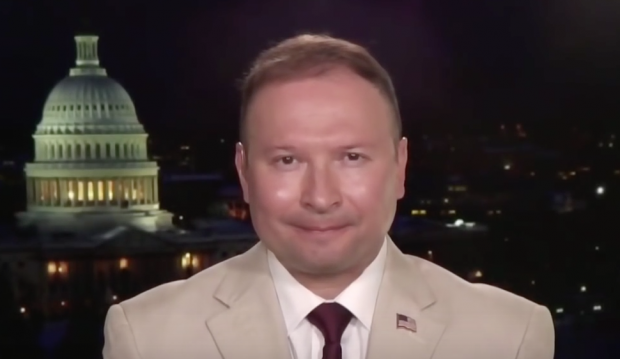The claim that the Trump campaign actively intervened to add pro-Russia, anti-Ukraine language to the GOP platform at the party convention in July has reached mythological status in the realm of political punditry. And the narrative reached new heights last week in the wake of new reports that Trump campaign advisers met with Russia’s ambassador around the convention.
But a review of what actually went down at the July 11 meeting, which included members of the GOP’s subcommittee on national security, undercuts many of the claims in the liberal media.
The myth: Members of the Trump campaign changed the GOP platform in an effort to hobble Ukraine as it struggles to respond to Russia’s aggression.
Secondary myth: Donald Trump, his campaign manager, and one of the Trump team representatives at the platform meeting have lied or changed their stories about their involvement in crafting the platform.
The players: Donald Trump, his campaign chairman at the time, Paul Manafort, Trump national security committee official J.D. Gordon, pro-Ted Cruz Republican delegate Diana Denman, and GOP national security subcommittee co-chairman Steve Yates.
Why it matters now: Gordon, a former Pentagon spokesman, was identified last week as one of several Trump campaign members who had encounters and/or meetings with Russia’s ambassador, Sergey Kislyak. Gordon met Kislyak at an event coordinated with the GOP convention in Cleveland. Some liberal pundits are now suggesting that Gordon may have discussed the platform issue with Kisylak.
What happened: During a July 11 hearing of the GOP subcommittee on national security, Denman, who hails from Texas, proposed a 300-word amendment to a draft of the GOP platform that called for the U.S. to provide “lethal defensive weapons” to Ukraine in its fight against Russia. The amendment was put into the platform, but not before it was itself amended to replace “lethal defense weapons” with “appropriate actions.”
What’s the problem: Denman was upset that the part of her amendment calling for “lethal defensive weapons” for Ukraine was edited and replaced with less aggressive language.
“I was troubled when they put aside my amendment and then watered it down,” Denman told Washington Post columnist Josh Rogin days after the incident. She said she asked Gordon, “What is your problem with a country that wants to remain free?”

Kellyanne Conway and Paul Manafort (Getty Images)
Denman’s outcry fit nicely into the emerging narrative that Trump was pro-Russia. Trump, Manafort and Gordon, the Trump representative to the platform committee, were also accused of lying or changing their stories about how the platform was altered.
Part of the confusion began with a misleading question from NBC’s Chuck Todd in a July 31 interview with Manafort.
Todd asked Manafort, a former consultant for a pro-Russian politician in Ukraine, why the “Trump team essentially changed the Republican Party’s views when it comes to Ukraine” by altering the GOP platform.
Though the premise of the question was misleading — the Trump team did not change any existing GOP platform, much less its views — Manafort answered without offering important nuance about the platform meeting.
“It absolutely did not come from the Trump campaign,” Manafort said.
Trump did not help matters when in an interview the same day with ABC’s George Stephanopoulos he said that he had “nothing to do with” the crafting of the Ukraine language.
“Why did you soften the GOP platform on Ukraine?” Stephanopoulos asked Trump in a July 31 interview.
“I wasn’t involved in that. Honestly, I was not involved,” Trump responded.
Some news outlets jumped on what at first blush seemed like glaring inconsistencies in Trump’s and Manafort’s comments.
“Trump campaign changed Ukraine platform, lied about it,” was one headline from The Daily Beast last August.
“Trump campaign guts GOP’s anti-Russia stance on Ukraine,” read the headline from The Washington Post.
But in an interview with TheDC, Gordon calls the entire saga “fake news.”
“Nobody from the Trump campaign changed the platform,” he insisted.
Yates, the subcommittee co-chairman and head of Idaho’s Republican party, vouched for Gordon’s version of events versus Denman’s.
“It is an insult to the process and the rights of other delegates on the committee for anyone to suggest that just because her amendment did not succeed 100 percent in tact that there was anything irregular or improper about the process,” Yates told TheDC.
He said that there was nothing “unusual or improper” in the Trump representatives’ actions at the platform meeting.
“If anything, the Trump campaign had a lighter hand on the platform process than any of its predecessors going back through Romney, McCain, to Bush,” he said.
Nevertheless, Gordon’s involvement in tabling Denman’s amendment has taken on new significance for some liberal pundits following the revelation that he met Kislyak, the Russian ambassador, in July.
Gordon was identified by USA Today last week as one of several Trump advisers who met the diplomat last year. Gordon and Carter Page, an outside foreign policy adviser to the campaign who may be part of an FBI investigation into Trump campaign ties to Russia, met the Russian diplomat at an event in Cleveland during the GOP convention.
Gordon says that he spoke with Kislyak for a few minutes at a public event and later at a cocktail party, but did not discuss the GOP platform with him. He said he made boilerplate comments about a future Trump administration seeking to improve relations with Russia.

Former Trump national security adviser J.D. Gordon (Youtube screen grab)
Last week, following his comments confirming that he met Kislyak, Gordon was interpreted as saying that Trump was involved in crafting the infamous Ukraine platform language.
A Business Insider article from last week blared the headline: “Another Trump adviser has significantly changed his story about the GOP’s dramatic shift on Ukraine.”
MSNBC host Chris Hayes called Gordon’s meeting with the Russian ambassador, Sergey Kislyak, “enormous” news which showed that the Trump team was “obsessed” with helping Russia. He also claimed that Gordon’s remarks about how the platform saga went down contradicted Trump’s denials that he had anything to do with the platform.
But Gordon again insisted that Trump and Manafort had no direct say in the platform battle with Denman.
“I hadn’t spoken to Mr. Trump about the issue [of Ukraine] in months, yet clearly knew his position from my campaign role on the national security advisory committee,” he said in his interview with TheDC.
Yates, the co-chairman of the national security platform subcommittee, says that Gordon did not influence the delegates’ decision to alter Denman’s amendment. Other delegates objected to her proposed amendment because it was “too long” and amounted to what would “potentially be an act of war.”
A majority of the subcommittee — and not Gordon — voted to “amend the amendment” proposed by Denman, said Yates.
Either way, “the final platform text includes some but not all of what Ms. Denman proposed, but the language remains very supportive of Ukraine and skeptical of Russia,” said Yates.
Denman did not respond to a request for comment for this article.


